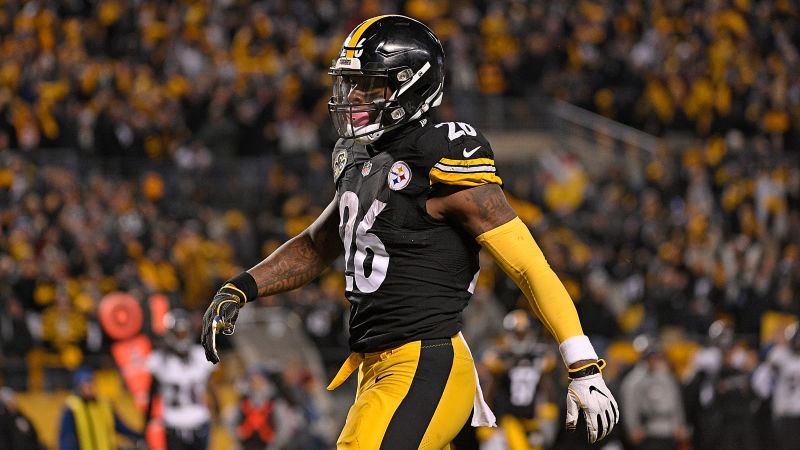NFL training camps are booting up this week, and that means it’s time for some of the very best players in the league to indicate that they won’t be attending, and in some cases to threaten that they will be sitting out the entire regular season as well. Holdouts are nothing new in the NFL, but some of the best players in the league are currently engaged in them, and that throws a light back onto one of the stranger truths about the NFL: that it is a fundamentally broken league.
ESPN has a helpful list of players who are currently holding out due to contract disputes with their respective teams. Some of the biggest names in football are on this list: Le’Veon Bell, Aaron Donald, Khalil Mack, Julio Jones (it’s since been reported that Jones and the Falcons have reached an agreement).
The most amusing parts of ESPN’s holdout explainer are the “What’s he looking for?” sections, which offer answers ranging from “hard to say,” to “it is unclear exactly what Donald wants.” It seems pretty clear what all these guys want: to earn as much money as soon as possible. The circumstances driving this desire are even clearer: Teams are not required to give out guaranteed contracts, and football’s inherent, career-shortening violence makes it extremely unlikely that they will ever earn out their current deals. Toss in franchise tags and constantly fluctuating positional pay scales, and just about every player who isn’t a star quarterback spends his career under constant threat of losing huge chunks of current and future earnings. Yet the reporting on any given holdout consistently misses the forest for the trees.
It’s impossible to imagine every NBA season beginning with the likes of Damian Lillard and Kevin Durant threatening not to play until their teams fork over a few extra million dollars. They’d never have to do that, of course, because they have guaranteed contracts and because the best players in the NBA aren’t making middle-reliever money.
It’s weird that Julio Jones, still with three years left on his contract, had to threaten a holdout out just to earn an extra $2.7 million this season! Weirder still is the fact that nobody seems too concerned that this is the state of things. Football reporters pass along updates about holdouts as unceremoniously as they describe training camp scuffles. Maybe this is because NFL reporters have a hard time avoiding stooge-like behavior. Maybe it’s that this problem has become so ingrained that reporters have a hard time even conceiving of it as a problem in the first place. It’s probably both of these things.
Whatever the cause of this shortcoming, the result is that holdouts are treated as nothing more than the normal course of NFL business rather than evidence that the entire league is built on a deeply flawed structure. All professional sports leagues suffer from tensions between the ownership and labor class, but the NFL succeeds in having this tension shot through with a the sort of derangement that makes annual mini-work stoppages part of the scenery.
The way to fix this problem is obvious: just guarantee every NFL player’s contract. Jones wouldn’t have a reason to fight so hard for that extra $2.7 million if he knew that a big chunk of the millions of dollars on the last three years of his deal weren’t liable to disappear if he slows down. Aaron Donald wouldn’t have to threaten to sit out the entire final year of his rookie deal if he knew that a guaranteed, nine-figure pay day was waiting for him on the other side. But there’s no way to even begin thinking about applying such a solution while the problem itself is taken as business as usual.
By the end of this season, the Pittsburgh Steelers will have enjoyed six years of spectacular running back production from Le’Veon Bell. They will have been provided all of that without ever having to give him a long-term contract. They’ll give the ball to him another 350–400 times this season, at which point they’ll cast him into free agency as an overworked running back nearing the cliff face that star runners tend to tumble over as soon as they turn 28. He’ll probably have to take a bargain contract at that point, because NFL teams are too smart to hand much guaranteed money to an aging running back. If he’s lucky, he’ll play a few more injury-free years and finish up his career as one of the best dual-threat running backs to ever play the game, and as a guy who never really came all that close to earning the amount of money his skills demanded. Nobody will ever care too much about that last part, and the whole system will just rumble on, as broken and strange as it’s ever been.
Nothing will change because the people with the power, the owners, have no incentive to make any changes. They will go on discarding and antagonizing players while league revenues soar, and the players go on using what little leverage they have to scratch out what extra dollars they can. Only one of these groups ever really gets maligned in this arrangement:
A system in which players almost never receive the compensation or job security to which they should be entitled and then are cast as the bad guys for seeking a small fraction of what they’re due is a system that should be dismantled. Someone should tell that to the football press, and to the players’ union while they’re at it.
